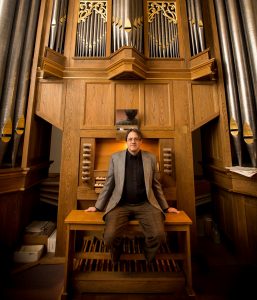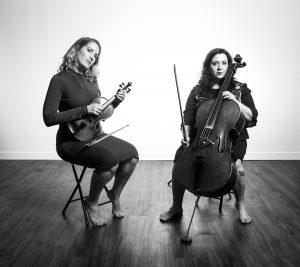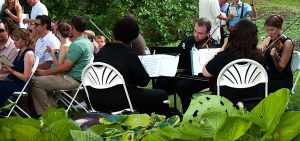ANYTHING GOES: Musical conventions for weddings are all over the map
At the end of Wagner’s opera Lohengrin, the source of the most famous bridal march of all, poor Elsa collapses and dies as her heroic groom (who is a Knight of the Holy Grail, after all) sails off to a higher destiny. Misogynistic much? Perhaps it’s a relief that this tune, “Here Comes the Bride,” along with much of the other wedding music Americans adopted from Europe, has begun to fall by the wayside.

As with nearly every other aspect of American nuptials today, musical traditions have undergone fundamental changes during the last generation: And there’s no reason to think this trend is going to reverse itself.
“When I first started playing weddings in the late ’80s, it was pretty common for people to just come in and ask for the Lohengrin March for the bridal procession, and the Mendelssohn March for the recessional, and that would be it,” said Kurt Knecht, organist at St. Paul’s Episcopal Church, who has played more weddings than he can count. “Any more, I can’t even tell you the last time I’ve played either one of those pieces for a wedding.”
The most common tune for a bridal procession today? Yup: It’s Pachelbel’s famously repetitive Canon in D, which suits musicians just fine because it can be played ad infinitum and stopped at any point as needed. “If they ask me for a recommendation, I say, Do the Canon! I’ve had it memorized for 30 years,” said cellist Sascha Groschang, whose Juniper String Ensemble is a favorite at local weddings, with a laugh. There are other favorites, of course: Purcell’s “Trumpet Tune” or Bach’s “Jesu, Joy of Man’s Desiring.” And Juniper is an ad-hoc group that can provide a quartet, a trio, or even a string duo. “Whatever fits your budget. For smaller venues you don’t even need a string quartet: You’d almost be outnumbering your guests.”

Of course, the Wagner March still pops now and then, but Sascha corroborated Kurt’s remarks that traditional melodies have seen a sharp decline in recent decades. “Any love song that you hear on the radio, whether it’s from 1965 or today, that’s what people want,” she said, adding that her string ensemble plays far more popular tunes at today’s weddings than it does traditional tunes.
Unlike Kurt, whose position at a church implies a more conventional approach, Sascha and her colleagues find themselves playing everything from “Signed, Sealed, Delivered” to “Who Let the Dogs Out?” And that’s just for the ceremony!
Moreover, nearly half of the weddings that Sascha plays are outdoors, which suggests an even less conventional approach. (Today only about 20 percent of weddings are held in places of worship, as opposed to 41 percent in 2009, according to studies by The Knot Real Weddings.) Thus while many organists are limited by the traditions of their host churches (popular music being frowned upon), Sascha and her colleagues make increasing use of something called Vitamin String Quartet, a Los Angeles-based team of producers and string players that sells sheet-music arrangements of hundreds of popular songs. The range is wide: “We get people who want Radiohead or Sigur Ros or that kind of vibe,” Sascha said. “And then we get people who want really ‘poppy’ stuff, like Taylor Swift.”
Kurt said that throughout his career, he and other church musicians have often found themselves talking people out of bad ideas. “Once in Dallas someone asked for the Texas A&M fight song as a recessional,” he said. “The music director said, I know you think this is a good idea now, but 10 years from now, when you’re watching the video of your wedding, this will not seem as classy as it does now.” Sascha, in contrast, pretty much does what people ask. “If you want ‘Smells Like Teen Spirit’ … I just smile and say, If we can do it, we will. I’m here to serve.”

Both Sascha and Kurt have seen their share of bizarre wedding moments. “Often it’s hard to sit up there in front and be on display,” Sascha said. “I get the giggles pretty easily.” Kurt remembers a wedding (in another city, he emphasized) in which the groom pulled out a blue-lacquered saxophone during his vows and played a five-minute Kenny G-style solo right into his bride’s face.
Couples today are just as likely to use top-40 tunes or themes from recent movies or TV shows as they are traditional songs. Sascha has played everything from Lord of the Rings music to an entire wedding of music from the “Final Fantasy” video game. Kurt has seen the gamut as well: “I once got asked to do ‘It’s a Small World After All’ as a processional,” he said. “They wanted an all-Disney wedding.”
Many couples today take the next step, opting for a computer playlist of actual recorded songs, which they then just pipe into speakers. But a refreshing number still yearn for the classiness of professional musicians, and wedding planners keep lists of trusted professionals and DJs for such occasions at their fingertips. “We know the music scene well in the wedding world, from ceremony musicians to reception entertainment,” said Kindra Browne, Owner and CEO of the Olathe-based Simple Elegance Wedding Consulting Firm. “We give the couple suggested vendors based on what they say their wants or needs are, and what they have to invest in the music. … Some really care about the music, and some don’t as much.”

Of course, music used for the actual ceremony is just one piece of the nuptial puzzle. A whole separate mechanism kicks in for receptions: Most couples, in fact, spend far more on “music to dance to” than they do on their ceremonies. (Websites such as theknot.com or weddingwire.com direct your search to lists of local resources for the sort of music you want.)
Many couples still go all-out, Kindra said, with live music for the ceremony, a full-scale band at the formal reception, and a DJ for the after-party. But she emphasized that, when it comes to music, the main concern is to make sure there’s “a variety of songs, especially if the couple has a guest list that spans several generations.”
—Paul Horsley
To reach Paul Horsley, performing arts editor; send an email to paul@kcindependent.com or find him on Facebook or Twitter (@phorsleycritic).




